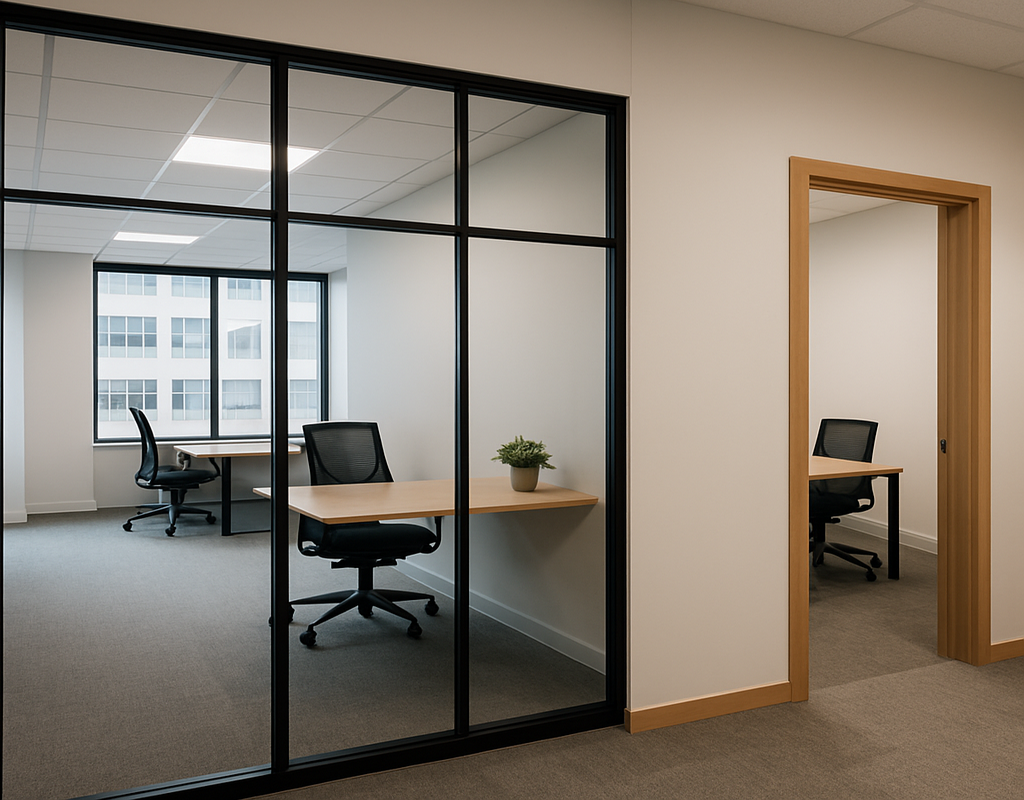
When it comes to designing a productive, inspiring, and efficient workplace, choosing the right office partitions can significantly impact not only the aesthetics but also the functionality of the space. One of the most common dilemmas in modern office design is deciding between solid wall partitions and glass partitions. Each has its distinct strengths, making the decision less about which is better and more about which is right for your specific needs.
In this guide, we’ll explore the key differences between these two popular wall partition types, offering a clear office partition comparison to help you choose the best office partition for your layout, workflow, and brand identity.
What Are Solid Wall Partitions?
A solid wall partition is more than just a barrier, it’s a commitment to permanence, structure, and seclusion. Built from dense materials like drywall, plasterboard, concrete, or brick, these office wall dividers create rooms within rooms, giving spaces clear boundaries and a sense of enclosure that’s hard to replicate.
What makes solid wall partitions distinct is their ability to absorb and block sound. This makes them ideal in settings where privacy is non-negotiable like executive suites, HR offices, boardrooms, or focus zones where deep work takes place. They act as both physical and acoustic shields, helping to control distractions and create zones of calm within bustling office environments. Beyond functionality, they also bring a sense of stability. Their presence conveys a traditional aesthetic, often aligning with brands that value formality, structure, and hierarchy in their workspace design. When treated with finishes like paint, wallpaper, or wood panels, they offer a customizable look that reflects company culture just as powerfully as any design trend.
What Are Glass Partitions?
Glass partitions are internal, non-load-bearing walls made primarily from tempered or laminated glass panels. Used to divide interior spaces without sacrificing visibility or light, they function as open modern office wall dividers that provide structure. Often framed in aluminum or left frameless for a minimalist look, these systems are a key part of contemporary office design.
What sets glass partitions apart is their ability to balance division and connection. Unlike solid wall partitions, which completely block sight and sound, glass wall partitions allow teams to stay visually connected, promoting transparency, collaboration, and natural light flow throughout the space. They’re available in various finishes like clear, frosted, tinted, and patterned to suit different levels of privacy and branding needs. With optional acoustic treatments, glass partitions can also meet sound-control requirements, making them suitable even for meeting rooms and private offices. Modular by design, these partitions are easy to install, remove, or reconfigure, making them an ideal solution for companies seeking flexibility and scalability. Their lightweight nature and minimal structural disruption also make them a forward-thinking alternative to traditional wall partition types.
Solid Wall vs Glass Wall Partitions
| Feature | Solid wall partitions | Glass wall partitions |
|---|---|---|
| Privacy | Solid walls offer excellent privacy, blocking sound and vision. They create enclosed spaces, reducing distractions. | Glass partitions provide less privacy, allowing for visual openness, but can be fitted with frosted or tinted glass for more seclusion. |
| Natural light | Solid walls can restrict the flow of natural light, leading to a darker space. They are ideal when light control is not a priority. | Glass partitions enhance natural light, keeping spaces bright and airy, contributing to a more open and collaborative environment. |
| Installation time | Installation of solid walls can be more time-consuming due to the materials used and complexity of fitting. | Glass walls are quicker to install, often requiring less structural work, and can be set up with modular systems for faster assembly. |
| Acoustic performance | Solid wall partitions are superior for soundproofing, providing high noise reduction for areas that need privacy, such as meeting rooms. | Glass partitions offer moderate acoustic performance but are less effective at blocking sound, unless extra soundproofing materials are added. |
| Cost | Solid walls are generally more affordable, depending on the material and thickness, making them cost-effective for large spaces. | Glass walls tend to be more expensive, especially if they include high-quality glass or customized finishes, adding to both material and installation costs. |
| Flexibility | Solid walls offer limited flexibility once installed, as they are permanent and require significant effort to modify. | Glass partitions are more flexible and can be easily adjusted, repositioned, or removed, making them ideal for evolving office layouts. |
| Aesthetics | Solid walls give a more traditional, corporate look, offering a sense of structure and permanence. | Glass partitions have a sleek, modern appearance, contributing to a contemporary aesthetic with an emphasis on transparency and openness. |
| Maintenance | Solid walls are relatively low-maintenance, requiring minimal care, but may need repainting or patching if damaged. | Glass partitions require more frequent cleaning to maintain their clarity, and can be prone to scratches or fingerprints, though repairs are generally simpler. |
Which One Is Right for Your Office?
1. Office layout and goals
When selecting between solid and glass partitions for your office, it’s essential to consider your office layout and specific goals. If privacy and quiet are priorities, solid walls create a more enclosed and soundproof environment, perfect for meeting rooms or private offices. On the other hand, if an open, collaborative atmosphere is the goal, glass partitions offer visibility and light flow, contributing to a spacious feel without sacrificing functionality.
2. Budget considerations
Budget plays a significant role in determining which partition type suits your office best. Solid walls are generally more affordable, making them a good option for larger spaces that need to be divided quickly and cost-effectively. Glass partitions, while more expensive upfront, offer long-term value with their aesthetic appeal and flexibility.
3. Branding and aesthetic needs
Branding and aesthetics are important factors in choosing the right partition. Glass partitions are a great option as they offer a professional, modern, clean look and can be easily customized with logos or company names using glass films. Solid walls also allow for branding through paint, murals, or graphic designs, giving a more structured and traditional look. While both options provide room for personalization, glass partitions are a popular choice for their balance of style, transparency, and flexibility.
How Easy Are These Partitions to Change or Adapt Later?
1. Glass partitions are easy to reconfigure and relocate
Glass partitions offer excellent flexibility when it comes to adapting or reconfiguring your office space. They are often modular, making it easier to move, adjust, or even remove sections without significant disruption to the overall layout. This adaptability is particularly valuable for businesses that may need to change office configurations as they grow or shift their priorities. Glass partitions allow companies to make quick adjustments without incurring high costs or extensive downtime, making them an ideal choice for dynamic environments.
2. Solid walls require more effort and budget to change
Solid walls, on the other hand, are more permanent and involve greater effort and cost to modify. Reconfiguring or relocating these partitions often requires demolition, new materials, and additional labor, making the process more time-consuming and expensive. For businesses that anticipate frequent changes in their office layout, solid walls can become a limiting factor, hindering the scalability of the workspace. This makes them a less ideal choice for companies that are rapidly growing or evolving, as their space needs may shift frequently.
3. Importance of scalability in growing businesses
For growing businesses, scalability is essential when choosing office partitions. As your team expands or your workflow changes, the ability to adapt your office layout quickly and cost-effectively can significantly impact productivity and the overall work environment. Glass partitions offer a level of scalability that solid walls cannot match, allowing businesses to adjust their office space with ease. The flexibility to modify your workspace as your company grows ensures that the office layout can evolve along with your needs, making it a crucial factor for long-term success.
Need Privacy or Quiet? Here’s How Each Option Performs
For businesses that need privacy and quiet, solid walls excel in providing superior noise control and confidentiality. Their dense structure acts as a strong barrier against sound, making them the ideal choice for spaces like meeting rooms, private offices, or any area where confidentiality is key. Solid walls are naturally effective at blocking out noise, ensuring a quiet environment, free from distractions. This makes them the go-to solution for offices that require privacy and reduced sound interference for focused work.
While glass partitions offer a more open, modern aesthetic, they are less effective in controlling noise. The transparency of glass allows sound to travel more easily between rooms, which can be an issue in areas that require high confidentiality or need to be soundproofed. However, there are options to enhance the acoustic insulation of glass partitions. Adding soundproofing films, frosted glass, or installing acoustic panels can significantly improve their ability to reduce noise and maintain privacy. These modifications can make glass partitions a more viable choice for offices that value both transparency and quiet, though they may require additional investment and effort to achieve the desired acoustic performance.
Sustainability & Environmental Impact
1. Reusability of glass systems
Glass systems are highly reusable, as they can be disassembled and relocated without significant degradation in quality. This reusability reduces the need for new materials when office layouts change, contributing to a more sustainable approach. Their modular nature also allows for easy repurposing in different settings, making glass a flexible, eco-friendly choice for evolving workspaces.
2. Energy efficiency and insulation
Energy efficiency is another key factor in the sustainability of office partitions. Properly designed glass systems help regulate temperature and reduce the need for artificial heating or cooling, improving the overall energy efficiency of the office.
3. Waste and material lifecycle
Solid walls typically have a higher environmental impact due to the materials used, as they are more difficult to recycle and repurpose. The production and disposal of solid wall materials often contribute to higher waste generation and a shorter lifecycle. In comparison, glass partitions, tend to have a lower environmental footprint, as they are easier to recycle and can have a longer lifespan when properly maintained.
FAQs
Solid wall partitions are generally more budget-friendly than glass partitions, making them a cost-effective choice for larger spaces. Glass partitions, while more expensive upfront, offer a modern aesthetic and flexibility.
Glass partitions can provide sound insulation. To improve soundproofing, additional measures such as acoustic films or panels would be required.
Solid wall partitions tend to be more durable due to their robust construction, making them suitable for high-traffic areas. Glass partitions, though durable, are more prone to scratches and damage from impacts.
Glass office partitions can reduce privacy because they allow visibility between spaces, but frosted or tinted glass can enhance confidentiality.
Combining both solid and glass partitions in an office layout is a practical solution to balance privacy and openness. This allows for flexible, customized spaces while maintaining functionality and aesthetic appeal.














